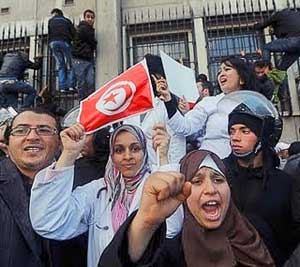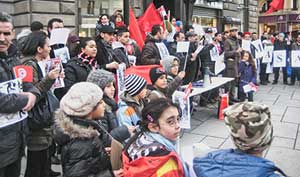A popular uprising in the North African state of Tunisia since mid-December has driven President Zine El Abidine Ben Ali, who had ruled the Western-allied government for 23 years, into exile. Ben Ali fled on Jan. 14 after tens of thousands of workers and youths attacked the Ministry of the Interior and other government buildings in the capital of Tunis and in the city of Carthage.
 Protesters in Tunisia. |
When a street vendor who was attacked by police committed suicide by self-immolation on Dec. 17, it unleashed this enormous struggle. Defying tear gas and even live fire from the security forces that killed between 50 and 100 people, thousands also demonstrated in dozens of Tunisia’s provincial cities until they brought down a repressive head of state.
The courage of the Tunisian people and their success in the first step of a continuing struggle has aroused solidarity and hope worldwide. It has sparked protest in neighboring countries like Algeria and Egypt, where high prices and unemployment have hit hard. It has also aroused interest in Europe, where a year of strikes and protests has not yet stopped “austerity” programs aimed at depriving the working class of its rights.
 Tunisian protest in Vienna. Photo: Anti-Imperialist Camp |
Initially Prime Minister Mohammed Ghannouchi was appointed to succeed Ben Ali. By the next day, however, on Jan. 15, the speaker of the Parliament replaced the former head of state of this country of 10.4 million people. That same day the army seized the airport near Tunis and then moved into the capital in an attempt to restore state control of the streets.
Militias suspected of being tied to Ben Ali have opened fire on the population and have clashed with the regular army, according to some reports. Popular and neighborhood groups have formed self-defense forces to protect their communities.
New government shaky
Because Ben Ali’s ruling Constitutional Democratic Rally (RCD) political party was still represented in the new leadership, it immediately drew criticism and protest from the masses. This new group announced on Jan. 16 that it would form a government of national unity to bring in representatives of opposition parties, professional groups and trade union officials.
The RCD officials invited moderate opposition parties into the coalition government. These are the Democratic Progressive Party and the Democratic Forum for Labor and Freedoms. Al-Jazeera journalist Ayman Mohyeldin reported Jan. 16, “We know the incoming national unity government will have three members of the opposition. It will include some technocrats, independents, and economists and some figures from Tunisian labor and trade unions. Some of those have still to be determined.”
As of Jan. 18, the political parties banned by the Ben Ali regime — those who were strongest in opposition — were excluded from the proposed government of national unity.
These parties include the Hizr ut-Tahrir, a Pan-Islamic organization formed in 1953 in Palestine that has affiliates throughout the region; another Islamic party, the Hizb al-Nahda or Renaissance Party, which has some electoral support inside the country; and a left organization, the Tunisian Workers’ Communist Party (PCOT), which grew out of the student movement and was formed in 1986.
In an interview with Al Jazeera on Jan. 17, PCOT leader Hamma Hammami, who had been freed from prison Jan. 14 during the mass uprising, said, “This is a national government which has nothing national about it. It’s intended to conserve the old regime in power with all of its authoritarian institutions in place. This is why people are taking to the street with a new slogan ‘we don’t want the RCD’.”
The General Labor Union of Tunisia (UGTT) has been repressed over the last two decades by the ruling RCD party. However, over the last three years there has been independent trade union activity, particularly in the Gafsa mining basin, where industrial actions have taken place since 2008.
By Jan. 18, three leaders of the UGTT opposition parties who had accepted cabinet posts resigned. Two cabinet members who were RCD leaders resigned from that party. The situation was still fluid.
Military and security forces split
Since the rebellion began throughout Tunisia, there seems to have been a split between leaders within the security forces presumed to be more loyal to ousted president Ben Ali and the military, headed by Gen. Rachid Ammar. The head of the security forces, Ali Seriati, was reportedly arrested on Jan. 15 while trying to flee over the border with Libya.
There were claims the following day of gun battles outside the presidential palace in Carthage between elements still loyal to Ben Ali, on one side, and the regular military on the other. Interior Minister Rafik Belhaj, who had been relieved of his duties by Ben Ali earlier in the week in an effort to calm protests, was also reported to have been detained.
With rising tensions between the military and the security forces, people are arming themselves for protection against state violence. Al-Jazeera correspondent James Bay reported, “In between the roadblocks, we were coming across large groups of people who had their own home-made weapons, axes and steel bars.”
Whither Tunisia and North Africa?
Protesters said all Jan. 17 that they wanted more than just Ben Ali’s departure. The demands of the youth and workers have been centered on the need for full employment and the control of inflation stemming from the impact of the global economic crisis. Ayesha Sabavala, deputy editor of the Economist Intelligence Unit based in London, told Al-Jazeera, “If the interim government doesn’t quickly implement measures to reduce the level of unemployment and increase standards of living, we are going to see more of these protests.”
Demonstrations on Jan. 14 and 15 focused on the hated Ministry of the Interior and other government buildings. The new interim administration, which is still controlled by the ruling RCD party, will not willingly give up control of the police and army — the state. Nor will leading officials within the political establishment give up their posts unless, like Ben Ali, they see no other alternative when faced with a concerted, organized mass force.
In neighboring Algeria, demonstrations have also been taking place since late December. Four young Algerians tried to burn themselves to death, as did one person in Egypt and one in Mauritania. These developments in North Africa impact U.S. and French imperialism, which have both escalated their military and economic involvement in the region over the last several years.
The outcome of these developments in Tunisia and throughout the region will depend upon the degree of organization and political determination of the workers and youth. Will the Tunisian masses rejuvenate a national democratic revolution inside the country that will be anti-imperialist in its orientation? The anti-colonial and neocolonial histories of both Tunisia and Algeria have encompassed left tendencies that have operated both within the trade union movement and among the youth.
Washington has targeted North Africa in its so-called “war on terrorism.” Revolutionary developments there can lead to new military interventions, and anti-imperialists and anti-war activists here will have to oppose imperialist intervention. The outcome of these developments in the region portends much for the international working-class struggle against the worsening economic crisis throughout the world.
Throughout the past year European workers have held massive demonstrations and general strikes protesting austerity programs connected with the worsening global economic crisis. In Portugal, Italy, France, Spain, Ireland and even Greece, where demonstrations and rebellions have been the most widespread and militant, the actions of the workers and youth have not yet stopped the austerity programs, let alone forced the governments out of office.
The developments in Tunisia over the last month have gone further than any other series of demonstrations and rebellions against the crisis of world capitalism in the countries of Europe. While the situation in North Africa is more extreme, workers and youth in all the capitalist states throughout the world also face high rates of unemployment and rising costs of living.
The potential for the seizure of power by the workers or a coalition of progressive forces with strong and decisive proletarian involvement would prove to be a monumental political development with international implications. Such a demonstration of revolutionary organization and political direction would set a precedent for a general response of the international working class to the current global economic crisis.
Historical lessons
As Russian revolutionary V.I. Lenin wrote in a letter to the Central Committee of the Russian Social Democratic Labor Party in September of 1917, prior to the successful seizure of power by the Bolsheviks, “To be successful, insurrection must rely not upon conspiracy and not upon the party, but upon the advanced class. That is the first point.”
Lenin continues saying that “insurrection must rely upon a revolutionary upsurge of the people. That is the second point. Insurrection must rely upon that turning point in the history of the growing revolution when the activity of the advanced ranks of the people is at its height, and when the vacillations in the ranks of the enemy and in the ranks of the weak, half-hearted and irresolute friends of the revolution are strongest. That is the third point.”
He then notes that “these three conditions for raising the question of insurrection distinguish Marxism from Blanquism [referring to a French revolutionary who focused on insurrection by a small group]. Once these conditions exist, however, to refuse to treat insurrection as an art is a betrayal of Marxism and a betrayal of the revolution.” (Lenin, “Marxism and Insurrection”)




















Sem comentários:
Enviar um comentário